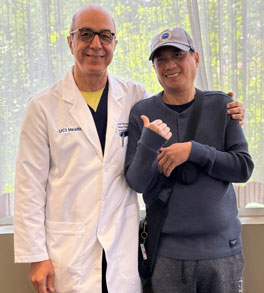Drummer beats back kidney cancer in clinical trial

When Glenn Marquez came to the United States from his native Philippines in 2022, he had been diagnosed with advanced kidney cancer.
Then 54, Marquez was in so much pain, he could hardly walk. Playing drums, a physically demanding passion he’s had since childhood, was out of the question. Although he had been diagnosed in 2020, the COVID-19 pandemic delayed his treatment.
By the time Marquez came to UCI Health and sought care from Dr. Arash Rezazadeh Kalebasty, a medical oncologist at the UCI Health Chao Family Comprehensive Cancer Center in Orange, his cancer had spread to other organs. Surgery was out of the question.
To begin attacking Marquez's adrenal cell carcinoma, Rezazadeh started him on immunotherapy and targeted therapy, one of the standard-of-care treatments for his type of cancer. It worked for a few months until Marquez’s disease once again began to progress.
Alternative therapy proposed
When Rezazadeh approached him about an alternative treatment available in a clinical trial, the exhausted, frail Marquez was skeptical and wary of signing up for yet more therapy — especially one with an uncertain outcome.
“People tend to be afraid of clinical trials," says Rezazadeh, a professor in the UCI School of Medicine Division of Hematology-Oncology who specializes in targeted therapies for cancers of the kidney, prostate, bladder and testes. "They don’t want to feel like a guinea pig.”
Rezazadeh told Marquez that he believed a new class of drug being studied in the clinical trial could help him fight the cancer, as well as add to the scientific knowledge about adrenal cell carcinoma treatment.
Overcoming skepticism
“Patients’ initial reaction of skepticism is understandable,” Rezazadeh acknowledges. Through education and conversation, the oncologist tries to demonstrate the value of participating in clinical trials at an academic medical center such as UCI Medical Center.
“We try to help a patient see that a trial offers an opportunity to receive leading-edge treatments, including therapies that aren’t available because they have not been approved by FDA yet.”
Clinical trials are also an opportunity for patients, themselves, to help test therapies for conditions that were once difficult or impossible to treat.
After Rezazadeh discussed the pros and cons with Marquez and his family, the drummer enrolled in the trial in July 2022.
That decision changed the course of his future.
“His condition immediately began to improve,” Rezazadeh marvels. “The treatment shrank his tumor and took away his pain so he could stop the cocktail of medications he was taking.”
‘This drug really saved his life’
Today, Marquez’s cancer is under control. He continues to take the oral medication and undergoes blood tests. He also visits Rezazadeh and the cancer center team for regular monitoring.
The current treatment may one day lose its effectiveness, Rezazadeh says. But if that happens, there are other treatments that may be able to continue to give Marquez a good quality of life.
“This drug really saved his life,” Rezazadeh says, noting that the prevailing treatments indicated for his diseases would not have.
“The standard-of-care treatment only gave him a few months of disease control. Just because we call it ‘standard of care,’ that doesn’t mean it’s the best treatment. It’s just what’s available. We can offer clinical trials, which can go beyond that.”
Hitting the skins once again
Perhaps the surest sign that Marquez is feeling better these days is that he is picking up his sticks every so often, performing both public and private gigs throughout Orange County.
What the Fullerton resident feels most, though, is gratitude.
“I am so thankful to Dr. Rezazadeh and all the nurses who helped me.”
Related stories
- Clinical trial targets antibodies to treat rare form of myasthenia gravis ›
- Breast cancer patient is on the move again ›
Explore further
Browse more blog posts by topic.




